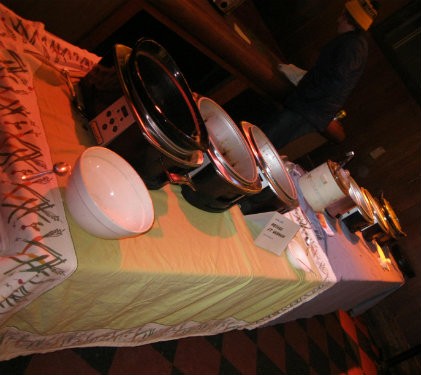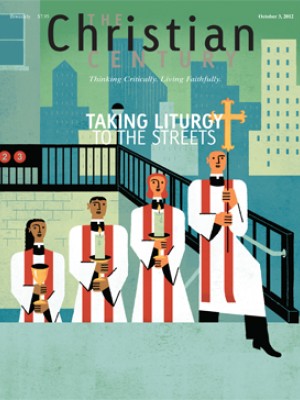Soup night at the bar: The rules are simple

I’d been hanging around the Hideout, a small bar in Chicago on an aging industrial strip, for more than a decade when I made the leap from patron to bartender in 2008. At that point, work in journalism had become hard to find. A book project I’d started floundered and then stalled. Staring down the barrel of another Chicago winter at age 40 and trying to figure out what to do next, I was, I admit, a little freaked. And then I started to serve soup.
Soup & Bread, the free community meal I launched in January 2009, didn’t start out as anything terribly ambitious. I was tending bar Wednesday afternoons and, frankly, it was a dead time. We don’t have a lot of happy-hour traffic. Things at the Hideout—a music club—don’t really get going until after dark.
Read our latest issue or browse back issues.
Free food seemed like a way of bringing people into the bar that would benefit both its bottom line and my own. The recession was hitting hard. More and more of my friends were losing their jobs. At times, it seemed like the whole city could just use a nice bowl of soup.
I asked a few friends from the food world if they would contribute a pot of soup to the cause and started to spread the word: free soup and bread, for all ages. Donations taken—one dollar, or five, or 20—for the local food bank. The first night, just after New Year’s, about 30 people turned up to sip soup from secondhand bowls. The next week saw twice that number; by March, we were a hit.
By now Soup & Bread is a wintertime tradition. We serve soup weekly from January through April. We’ve dished up thousands of bowls of soup and raised more than $30,000 for a wide range of hunger relief organizations.
Friends and I have staged Soup & Bread dinners across the country, from Brooklyn to Seattle, and others have taken the ladle and run with it, launching their own events in Madison, Milwaukee and elsewhere. Four-star chefs have donated pots of soup, as have local farmers and food activists, musicians and artists. The rules are simple: Bring two or three gallons of any kind of soup to the bar, then stay and serve it until it’s gone. It doesn’t have to be fancy, and it doesn’t have to hew to any local, organic ideal. We serve it with day-old bread donated by a local bakery and the occasional pie or cookies delivered by motivated friends.
Along the way I’ve had plenty of time to think about what it is we’re up to. In many ways Soup & Bread is defined by all that it doesn’t do. Beyond the food and conversation, it doesn’t offer much in the way of entertainment: no bands, no lectures, no slide shows. It doesn’t offer cooking instruction or gourmet fare, and it isn’t designed to serve an impoverished population directly—unless you count the ways most of us are impoverished in community. Though we’ve never turned anyone away—and there have been guests clearly present just for the free food—the Hideout is, above all, a bar, and a tiny one at that. We don’t have the physical infrastructure or the social service skills (beyond those common to any bartender) to effectively help those in dire need of food and care. We don’t even have a kitchen.
But it’s not all negative space. In my quest for definition I’ve looked at it as an experiment in ad-hoc community building and a practical education in socially conscious business. It’s been grassroots activism, redistributing wealth one wadded-up $5 bill at a time. And at times, when I strive to keep cool as the cooks are looking for ladles and the Crock-Pots have blown a circuit and there’s a huddle four deep at the bar, it seems more a form of endurance-based performance art than anything else.
A friend once described Soup & Bread as “permaculture”—a mutually sustaining project that gives back to all who take part in it. Patrons get food, the food pantries get money, the bar gets business, and the soup cooks get . . . what do they get? I can’t speak for every cook, but more than one has told me they were surprised not just by how much fun they had behind the soup line but how gratifying they had found the plain moment of sharing soup with hungry strangers.
For a long time I shied away from calling Soup & Bread a ministry. It feels presumptuous to frame my own actions as such—and an imposition to apply religious language to the secular experience of eating soup in a bar. Yet the sharing of soup has deep religious roots—the associations stretch from contemporary soup kitchens through Lenten soup dinners and all the way back to medieval monasteries, where hungry travelers were once assured a bowl of soup at the gate.
Amy Kaherl, a former seminary student who runs a soup dinner that raises money for artists’ projects in Detroit, made the connection for me. “Every time I do soup,” she said, “it feels sort of like what ministry is supposed to be. You’re bringing people together and creating community around something beautiful. What could be better than that?” And in truth, at times I have looked at Soup & Bread as an extension of the Christian tradition of radical hospitality—the premise that by opening your doors to all comers regardless of identity or agenda, you can open yourself, and the world, to transformation.
Perhaps what makes Soup & Bread meaningful to the hundreds of people who have shared soup from our Crock-Pots is, in fact, its capacity to encompass a plurality of ideas and expectations. By being not-quite ministry, not-quite politics, not-quite social service, not-quite art, Soup & Bread may allow all of the above to happen at once. By resisting the act of naming, I—along with everyone who participates—am able to re-create and redefine the act of sharing soup with strangers over and over again, transforming the plain moment of a meal into something vital and alive.





